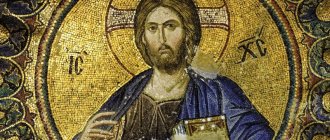Pastoral meetings. Jesus Prayer
“Lord Jesus Christ, Son of God, have mercy on me, a sinner.” Eight words that contain the Gospel. This is our confession of faith in Christ and our repentance. The Jesus Prayer is a generator that endlessly produces Divine grace. How can she learn how not to lose attention in a conversation with the Lord, say a prayer out loud or pray in silence? Hieromonk Luke (Aule), a resident of the Sretensky Monastery, answers these questions at Pastoral meetings.
– Father Luke, what is “doing the Jesus Prayer”?
- Everything is very simple. The Jesus Prayer is very short and in general it conveys the content of the entire Gospel. We confess Jesus Christ as the God and Savior of our lives and repent before Him of our sins and desire correction. This prayer reflects the entire Gospel: “ Lord Jesus Christ
- this is the confession of God, “
Son of God, have mercy on me, a sinner
.” The unclean ones themselves, when asked by the holy fathers about what they feared most, said that it was the Jesus Prayer. And all because it needs to be done very quickly, and the unclean do not have time to dispel the work with their thoughts. But the unclean ones interfere when we begin to pray mechanically and do not apply our minds to the words. Such prayer is called defiled.
– How not to get distracted during prayer and how to learn to pay attention?
– The first gift in the Jesus Prayer is the gift of attention. It comes in the mind, because it is with the mind, this purest part of our soul, that we pray to God, and, accordingly, this concentration of attention is formed in our mind. What is attention? This is not distraction by various thoughts that come to us from four sides: from our nature, from our mind, from the memories of our memory in rational power, from an angel and from the bad, let’s say, from the unclean. He, too, can defile us with these thoughts and instill them in us. Our mind gets used to attention. How? You just need to engage in prayer work and, first of all, focus your mind on the words of prayer, enclose your mind in the words of prayer. A repentant spirit is born in a person, the heart begins to sympathize with what it hears in its mind. When the heart is compassionate, crying of repentance begins for oneself as a fallen sinner. When a person begins to do this, his mind strengthens and receives a certain skill of attention. This gift of God does not come immediately, but it comes to those who are constantly engaged in doing it. You can practice doing this, for example, when you are in some bad state of mind. For example, you get irritated or judgmental, you are overwhelmed by envy of your neighbor’s success, or, for example, when you become discouraged. This spirit can come from anywhere, from everything. The enemy wants to destroy you every day, every second. Therefore, you must always take care of yourself and, first of all, watch your thoughts. The main task of a Christian is to watch his heart and ensure that his mind is not plundered.
The main task of a Christian is to watch his heart and ensure that his mind is not plundered
The Jesus Prayer itself is a generator that endlessly produces Divine grace, by which we move, are saved and heal our sin-damaged souls.
– Can you read the Jesus Prayer silently, to yourself?
– The Holy Fathers taught this: “At least in a whisper, say these prayers.” And if you absolutely do not have such an opportunity, then, of course, pray silently to yourself. For example, if we are traveling in public transport or are in a place where there are a lot of people, and we pray silently, we must apply our minds and not forget that we are praying. And if you have the opportunity, then at least in a whisper say the Jesus Prayer.
– Is it possible to combine the Jesus Prayer with worldly affairs? For example, I know a person who goes to the gym and at this time silently reads the Jesus Prayer.
– This is already aerobatics for a person, as far as I understand, to go to the gym and also say prayer. I think nothing bad will happen if you really say prayer in your everyday affairs. And I think that prayer will even immediately help you move away from something wrong and direct you to the right flow, to the right thinking.
I read the following story from the Optina elders. One man had a bird that learned to speak, and since this man constantly whispered the Jesus Prayer, this bird also constantly said it. And when a big bird flew at this bird and grabbed it, the little bird said the Jesus Prayer, and then the big bird let go of the little one and flew away.
– How to force yourself to be disciplined, focused in prayer, to give up laziness and how to tame your anger?
– This, of course, is a very interesting and very difficult question. As such, these passions - laziness and anger - belong to the irritable force. Fasting and prayer weaken the effects of passions in a person. And, in particular, when our mind and our desires come into order, the irritable force comes to a certain calm. But how can we bring into order the intelligent and desirable force? First of all, with the help of fasting, which we do not like from time to time. When we attach prayer to prayer, it helps us focus our mind on communing with God. We begin to really pray and stop being angry.
– If the mind is distracted by other thoughts, how much and how should one read the Jesus Prayer?
– The Jesus Prayer is creativity from creativity and art from arts, as the Holy Fathers say about it. Here you must have creativity with reasoning, and there must be advice with your spiritual father. I think everyone has participated in the Jesus Prayer to one degree or another and, probably, everyone has gone through certain stages. For example, the stage of insurance in prayer, when a person begins to be afraid, that is, begins to pray the Jesus Prayer and becomes afraid - this is insurance. The Holy Fathers reassure and say that such stages must be overcome by being blessed by your spiritual father, enduring such temptations, confessing them, and most importantly, not giving up this work. Certain stages of growth in prayer will inevitably be accompanied by some kind of sorrows and temptations. As Father Seraphim of Sarov said, books cannot teach you how to do it, it requires practice. Therefore, no matter how much we read, if you and I do not practice, we will not have movement as such.
The Jesus Prayer is creativity from creativity and art from arts
– Do I need to take a blessing to pray for other people?
– People are different, and people have different conditions, just look at your heart. You were asked to pray - you will pray. If you begin to experience some kind of temptation, tell your spiritual father that I began to pray for such and such a person and I felt bad, or such a temptation of the spirit began, or despondency set in, or something else - the confessor will immediately understand and tell you whether it is possible to continue praying or not. Therefore, I advise that everyone should have not a confessor, but some kind of mentor, a priest who gives you advice, blesses you, and prays for you. And this will already be a lot. But it is necessary to pray for people - this is commanded to us by the Lord. But if for some reason your confessor does not bless you to pray for someone, then listen to your confessor.
– Should we pray for our enemies?
– Praying for enemies is God’s commandment: “Pray for your enemies” (see: Matthew 5:44).
– I prayed for a suicide. This is bad? Can this be done?
- I'll give you an example. The Monk Anthony once stood at prayer, and a man came up to him from behind and said: “Anthony, pray to God for me.” He says: “Of course, I will pray.” And when he prayed to God about this man, the Lord said to him: “Do you know who you are praying for? For the demon." And Anthony says: “How? He asked me, and I pray to You. I didn’t know it was a demon. Why didn’t you reveal this to me?”, and the Lord said to him: “I did this so that you would understand that I am ready to forgive the demon if he repents. Tell this man, the next time he comes to you, to turn to the east and for three years, without leaving his place, pray a simple prayer: “Lord, forgive me my ancient malice,” and I will forgive him.” Anthony did just that when the unclean one appeared to him again, and he laughed and said: “Anthony, we don’t need this, we’re damned,” and left. Why am I telling you this? Ascetics also prayed for demons, feeling sorry for them that they would disappear and be tormented forever and ever.
And another story. The Optina elder did not bless the nun to pray for the demons, but she continued anyway, and the demons came to her and thanked her for her prayer. And then this nun committed the sin of Sodom and left the monastery.
– Father Luke, is it even possible to pray for demons without a blessing?
- This is a real beauty. The blessing of our spiritual father is sacred to us, and disobeying our spiritual father is already a sign of delusion.
– How to rejoice at the same time, because they say: “ Always rejoice.”
"(1 Thess. 5:16), and to grieve when we are called to grieve for our sins, because these two feelings are opposite to each other?
– Saint Ignatius (Brianchaninov), in his book, in the chapter on delusion, says that if you are standing in prayer and in prayer you were visited by tenderness, that is, you cried, rejoiced in your heart, received some kind of consolation - I think everyone experiences this, - then thank God for such a visit. But if the next day you begin to pray and again expect to be visited by such tenderness, then you are in delusion. There's something similar here.
We must always be in a repentant spirit. Always. And we should always have a confession formed in our hearts. We must always look at our hearts to see where we are sinning. And when a person comes to confession, if he lives a spiritual life, he always has something to repent of. And, on the contrary, when we come to confession and we have nothing to repent of, this is the question of whether we live a spiritual life? Therefore, to rejoice in the hope that God has mercy on us for our salvation, that God provides for us and wants our salvation, and does everything for this - this is our joy. And our repentance is that we do not fulfill the commandments of Christ, we sin, but we hope for His mercy.
We must always be in a repentant spirit. And a confession should always be formed in our hearts
- Father, please tell me what it means: “ Every man is a lie.”
"(Ps. 116:2) and "
He
who does not care for his own is worse than an infidel " (1 Tim. 5:8)?
– You and I are somehow damaged by sin. And this is a lie. The lie is that we are in sin, in this uncleanness, in this unclean spirit. And when we sin, and we sin constantly, in every day and in almost every minute, if not in deed, then at least in thought, and therefore in every day and in every minute you and I must, in contrast to this, always bring repentance to God and not despair, but always understand that we are sinful people. And out of this sinfulness, make a movement towards God. And, as a rule, these steps will consist in our humility, and humility, first of all, will consist in the fact that we recognize ourselves as sinners and therefore we do not care about who sins and what, what sins. In this case, we see ourselves, our sins, and repent of them. And when we see the sins of other people, we have no time to condemn these people, but rather, on the contrary, we have compassion and begin to pray for them, so that they will move away from these sins and repent, and so that they, like us, will have penitential work.
Well, as for the second part of the phrase “he is worse than an infidel”... A Christian has Christ in himself, that is, love, and love, first of all, is a sacrifice, when a person does not think about himself, but about another. A person no longer belongs to himself, he works not for himself, but for the sake of his neighbors out of love.
- Tell me, how not to judge?
– Somewhere from the Holy Fathers I read a very interesting instruction: if you find yourself in a situation where they are condemning your neighbor, immediately say: “Let’s better judge me, I’m worse than him,” and that will immediately end the conversation. Or: “Brothers, yes, he did something bad, but let’s now read the akathist for him.”
– When you fast, some people look at you like a black sheep and laugh at you. How to answer them with dignity?
– If you are condemned and slandered, and without any reason, then rejoice for it. This means you please God. It’s another matter if you are slandered for something, and you should always try to understand what motive this slander has. If you are condemned specifically for the Church, for Christ, then you are blessed, then you have pleased God. Remember how the apostles came, preached, and then they were beaten, and when they came out, they were joyful because they suffered for Christ.
– How to relate to evolution and prehistoric people who looked like monkeys?
– I’ll be honest: I don’t believe in Darwin’s theory that man descended from apes. God created man this way, not from any monkey, and there was no evolution. The Holy Scripture tells us about this.
I’ll give you a touching story from one wonderful priest - he died just recently - Archimandrite Anthony (Guliashvili). In the summer he was traveling on a train in a compartment, and his fellow traveler was a man who held a serious position, was a director, his nationality was Chukchi from somewhere in the northern regions. And he began to stubbornly fight with the priest over the fact that man descended from a monkey. And Father Anthony tried to explain to him this way and that. And he: “No, what are you proving to me? After all, so many books are devoted to the fact that man descended from a monkey. I went through evolutionary stages this way.” But the priest got tired, fell silent, and a large audience of listeners had already gathered. Father paused, sighed and said: “You know, it seems that you have convinced me. There are certain types of people who evolved from apes."
– What should be the correct attitude of a spiritual father to a spiritual child and vice versa?
– The most important thing: “Do not make yourself an idol.” When a spiritual father begins to overshadow Christ for a person, this is the most wrong thing. Let us remember John the Baptist, who points to the coming God the Savior. He preached about Christ, but said that he was not worthy to untie the thong of His sandals.
(Mark 1:7). We must always remember that the confessor only guides his child to God and in no case should he become an obstacle between the spiritual child and God.
– Why does a person fall into the same sins? How to stop this?
– First of all, you must know what our repentance is. It is not easy to name the same sins in confession. Repentance is changing oneself. When a person goes to confession, he must think about how and what needs to be done so as not to commit such a sin. He must think about how to get rid of this sin, what means to use. I knew one person who later became a monk. He said that when he went to confession, he did not repent of his sins, but worked on them. And perhaps for this the Lord had mercy and forgiven him. He worked every day on this sin, how not to repeat it, and did not repeat it, and when he had already been established in this work for about a month, and a second, and a third, he already saw that he was no longer committing this sin, he walked and confessed him. And whenever we fall into such sins, we sometimes do not think about our repentance and how we can work to eradicate this sin in ourselves, what to do for this.
– How to maintain grace after Communion? How do you understand which way to acquire grace is the best?
– At one time, the Monk Seraphim of Sarov said that most of all the Divine grace of the Holy Spirit is given by unceasing prayer and reading the Holy Scriptures and the Holy Fathers. Most of all, prayer, and in particular the Jesus Prayer, bestows upon man the grace of the Holy Spirit.
Chapter I. On the duality of man, learning, prayer and the cage.
A person is twofold: external and internal, carnal and spiritual. The outer is visible, carnal, while the inner is invisible, spiritual, or, according to the words of the Apostle Peter, “the hidden man of the heart, in the uncorruption of a meek and quiet spirit” (1 Peter 3:4). And Saint Paul explains human duality, saying: “Even though our outer man decays, yet our inner man is renewed” (2 Cor. 4:16). Here the apostle speaks clearly of the outward and inward man. Thus, the outer man is made up of many members, but the inner man comes to perfection through intelligence, attention to himself, the fear of the Lord and the grace of God. The deeds of the outer man are visible, but the inner man is invisible, according to the Psalmist: “A man will come, and the heart is deep” (Ps. 63:7). Likewise, the apostle says: “Who is the message of man that is in man, even the spirit of man living in him?” (1 Cor. 2:11). Only the One who searches hearts and wombs knows all the secrets of the inner man.











